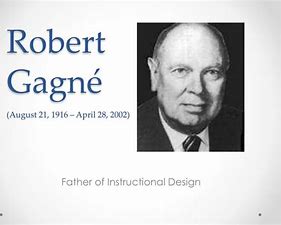Robert Gagne Theory 9 Levels - Bing images
was an educational psychologist that created the framework for an effective learning process. Gagne designed the Conditions of learning that have helped instructional designers, instructors, and teachers create more effective ways for their students to learn information based on information that they have internally and externally from stimuli that are presented to students outside of what they already know.
The Conditions of Learning is based on the information processing model that focuses on the cognitive events that occur when learners are presented with stimuli.
Today, you will learn and understand 3 key elements of the 9 levels of the effective learning process. You will understand why these 3 levels are essential for students to learn, and what effect it has on the students' learning outcomes.
The 9 Theory Levels are forms of communication that we as instructional designers present to learners. Even though the first level is essential for students to be present, the second step is equally important to their understanding or informing the learners of the learning objectives to help them better understand what they will be learning during the session.

2. Informing Learners of the Objective (Expectancy)
This particular level states what the learners will be able to accomplish during the session and how they will be able to use the knowledge in the future. This allows the learners to organize their thoughts on what they will learn and help place them in the proper mindset. Have you ever watched a television show and seen how they set up the storyline by giving you a glimpse or "trailer" of what you will be watching during the movie or show? This is the same way that instructors should prepare their students for what they will be learning in class as well.
Here are a few ways or techniques for stating the objectives:
- describe what they will be able to do at the completion of the session
- describe the required performance
- describe criteria for standard performance (what is the grading scale and what they will need to do in order to accomplish that grade)
- explain how their learning will benefit them (what are the results of what they will be learning)
The third level is called the act of retrieving the information that they have learned.
Stimulating Recall of Prior Learning (Retrieval)
Retrieval helps the learners make sense of new information by relating it to something they already know or something they have already experienced.
To accomplish this, present the learner with an experience or cue that stimulates their prior knowledge. Make connections between what they are learning and their previous learning. When students learn something new, it is best to correlate the new information with related information or topics they have learned in the past.
Methods or techniques for stimulating recall:
- ask questions if they have any previous experiences with the topic or material
- ask questions about previous experiences
- ask questions about their understanding of previous concepts
- give them an example of an experience similar to what they are learning
The Seventh level is based on reinforcement of learning and providing feedback. How often have you discussed or learned something, but you didn't have the opportunity to discuss what you learned? Learners want to know that what they are thinking is on track with what the instructor has taught, and this feedback gives them more context on their thinking process. It is important to provide immediate feedback on a learner's performance to assess and facilitate learning. This is also a good time to reinforce any important points.
This stage helps reinforcement of a current answer, gives guidance as to the degree of correctness of the task, and/or provides corrective and constructive feedback if the response or behavior is incorrect.
Tips on providing feedback:
- be positive
- be objective
- use first-hand observation
- deliver focused and concise feedback
- focus on areas the student can control
This was a sample of the three important learning levels based on educational psychologist, Robert Gagne. Today, we discuss the importance of providing feedback, stimulating recall of prior learning, and informing learners of the objective. The three levels included the preparation, instruction, and practice of learning.
https://educationaltechnology.net/robert-gagnes-taxonomy-of-learning/




Comments
Post a Comment